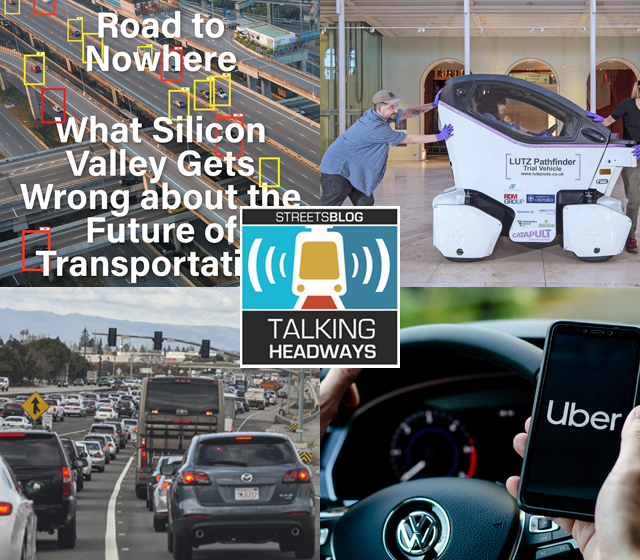This week, Paris Marx, author of, "Road to Nowhere: What Silicon Valley Gets Wrong about the Future of Transportation," talks about technologists, Ursula K. Le Guin’s "Carrier Bag Theory," and Uber’s impact on labor laws.
For those of you who prefer to read rather than listen, check out the edited highlights below the player. If you want a full, unedited transcript, be our guest by clicking here.
Jeff Wood: You spoke earlier about corporate power versus government power. When I was reading the book and then got toward the end, I was thinking to myself, in terms of Uber, what’s been more damaging, has it been the labor problems that have been more damaging or the transportation problems? I guess it’s not really pitting them against each other necessarily. But I’m wondering which one has had the most long term impact because maybe the transportation will kind of get fixed eventually as Uber and Lyft disappear or fold back into a taxi-like organization, whereas the labor stuff seems to be more impactful overall.
Paris Marx: I think we’re already starting to see that former point already happen — the move back into a more taxi-like structure. We can see Uber making deals with taxi companies in New York City, in San Francisco, in Italy, for example, in order to bring taxis onto the app. There are problems there, as well, especially if Uber is the one that now sets the rules for how taxis work. But I do think that the longer-term impacts are absolutely the labor effects, right? Especially in the places where Uber is successfully rewriting labor law, like in California, in order to carve out a third category of worker, we’ve already seen other businesses seek to reclassify their workers along those lines.
So Uber is still waging this campaign today in Canada, where I am, they’re still trying to get what’s called "Flexible Work Plus" implemented up here. They’re pushing on the government of Ontario in particular to do that. Over in the U.K., there was the Supreme court ruling last year on the rights of the workers saying that they’re not independent contractors, but workers. Specifically in that ruling, the Supreme Court said that they should be paid from log on to log off a minimum wage, but Uber ignored that particular aspect of the ruling because it doesn’t want to treat workers in that way. So now they’re going to have to sue again to get Uber to actually reflect that. This is a war that they’re waging in other countries as well. That is so even if Uber is never profitable, even if it fades away in a couple of years, because it’s proven that it’s never going to be a workable business. Because of higher interest rates, it can’t get the cheap money that it used to. Those labor impacts are going to stick around for a really long time. I think that’s the most troubling thing there.
Wood: I think that’s an interesting point — all of this money was sunk into giving people free rides and the benefit to the VCs and the people with capital is that eventually the whole system of labor is changing. It’s not necessarily even the transportation issue that comes about; it’s something completely different. I think that’s fascinating — that you can kind of mess with something on the right hand and then the left-hand kind of get comes around the other side and takes it.
Marx: One of the things that Huber Horan, who’s a longtime critic of Uber who who’s worked in transportation for decades, really pointed out was that there was an effort in the 1990s to further deregulate the taxi industry, funded by the Kochs, and really pushed by a lot of libertarian groups. That was unsuccessful [and] largely didn’t achieve its aims. But then when Uber was making its push, it picked up a lot of that playbook that was developed in the 90s and used it for its push to deregulate the taxi industry and ultimately to take on workers’ rights. So obviously I think that that’s going to be the, the longer-term impact of that. It’s a really harmful impact.
You can see how it’s connected to larger desires of capital to change the relationship with workers. But I would also say, even if Uber doesn’t work, as you’re saying, this is something that they will always have as a benefit, even if the Uber model collapses. But those investors also profited as well, even though Uber lost billions of dollars because when Uber IPOd, they were able to cash out and they bought in at a really low price. Right? So they really left retail investors and some others holding the bag on that. But a lot of the early investors both profited and have benefited from this reclassification and rewriting of labor law.






